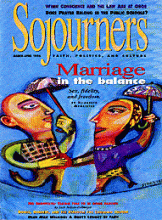Several weeks ago I was having lunch at a sandwich shop in downtown Washington, D.C. I hadn't been aware that everyone in the restaurant was African American until a homeless black man came in shouting something between lunacy and prophecy. He was yelling about Thanksgiving and "the Indians." He then drummed on the table, chanting "Plan-Ta-Shun! Reser-Va-Shun!"
Northwest author Sherman Alexie draws similar parallels between Native Americans and black history in his latest novel, Reservation Blues. Alexie and I both consider ourselves Spokane natives. But Alexie's ancestry goes back to the great Chief Spokane Garry, while the people who are my roots "discovered" Washington state's Inland Northwest through Lewis and Clark. Of course, they did get some help from Sacajawea. (Having grown up in Spokane, I only recently realized I had never been to the reservation 60 miles away.)
Legendary black Delta blues guitarist Robert Johnson spent some time on the "rez," and his arrival opens the story. In the 1930s Johnson told a white man he wanted to be the best guitar player ever to live. The white man responded, "Then you have to give up what you love most." Johnson replied that he would give up his freedom. While the real Johnson was murdered in 1938, in this book he is haunted by a guitar that won't leave his side until 1992 when he stumbles onto the Spokane Indian Reservation, meets up with some Spokane natives, and pawns the legacy off on their new band, "Coyote Springs."
THE LESSON APPEARS to be that commercializing one's culture isn't a real road to freedom. That moral reminds me of an interview on NPR from last summer: The editor of a conservative magazine was asked what he thought of affirmative action issues in relation to African Americans and a lack of cultural consciousness in the United States. The editor retorted that socioeconomic integration wasn't that far behind, and that "the blacks have made a
Read the Full Article
